KNOW-HOW
THE VINEYARDS
Edouard Guerin, Technical Director at L’Oratoire des Papes, is committed to cultivating the vines with the upmost respect for nature and the environment. The vines are carefully preserved thanks to gentle and most importantly natural cultivation practices.
Since 2008, the vast majority of the vines have been cultivated using organic methods. In order for the vine to remain in well nourished, in good health and well exposed, this precious terroir is cultivated using the most respectful cultivation practices possible. Although man cannot influence the deeper structure of the soil, what he can do is intervene in almost all other parameters in order to ensure the highest quality possible in the finished wines.
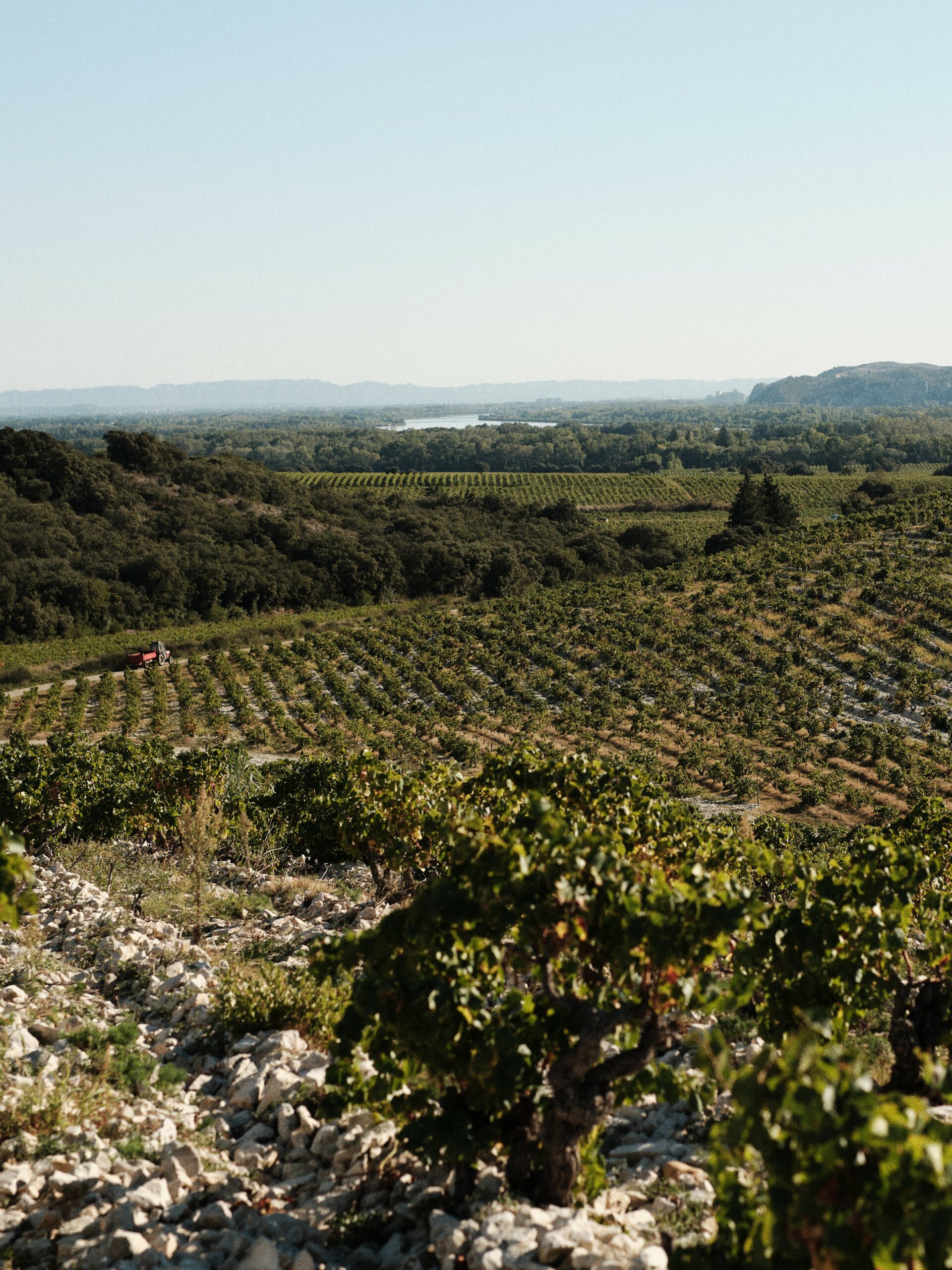
The soils are of the upmost importance as this is where the vine delves deep in order to nourish itself with water and minerals.
For the last 4 years, we have decided to definitively cease the use of organic fertilizers permitted in organic agriculture with the aim of using its own 100% natural fertilizers instead. In order to do so, a partnership was formed with a neighboring farmer for the supply of sheep, horse and cow manure. On average 7 to 10 tons of manure compost are provided every 3 years. This well balanced and complete fertilizer contains all of the necessary components for the growth of the vine as well as all the trace elements it requires. Furthermore, this compost is rich in micro-organisms which ensure the strong microbial life (fungus and bacteria) needed for the proper functioning of the soils. It imparts a unique texture to the soils and encourages the development of clay-humus complexes. Well nourished and living soils result in well nourished grapes which in turn give rise to living, breathing wines.
The vine is at the very core of our craft as this is what determines the quality of the fruit
As part of the continuous quest for excellence, a massal selection approach is used in the vineyards. The vines are produced from vieille vigne stocks selected for their intrinsic quality and high genetic variability. The heterogeneity of these parcels imparts complexity and depth to the finished wines. The plants are grafted by hand using the English cleft grafting method. This technique ensures better sap flow in the plant compared to classic omega grafting methods. And in order to guarantee an in-depth savoir-faire, the pruners receive training on how to preserve desiccation cones, prevent pruning wounds and respect the sap flow in the plant.
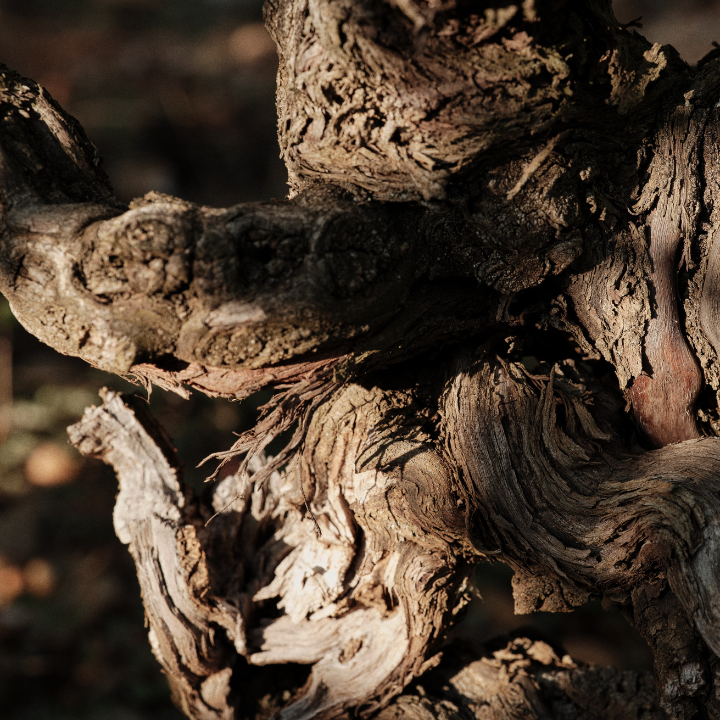
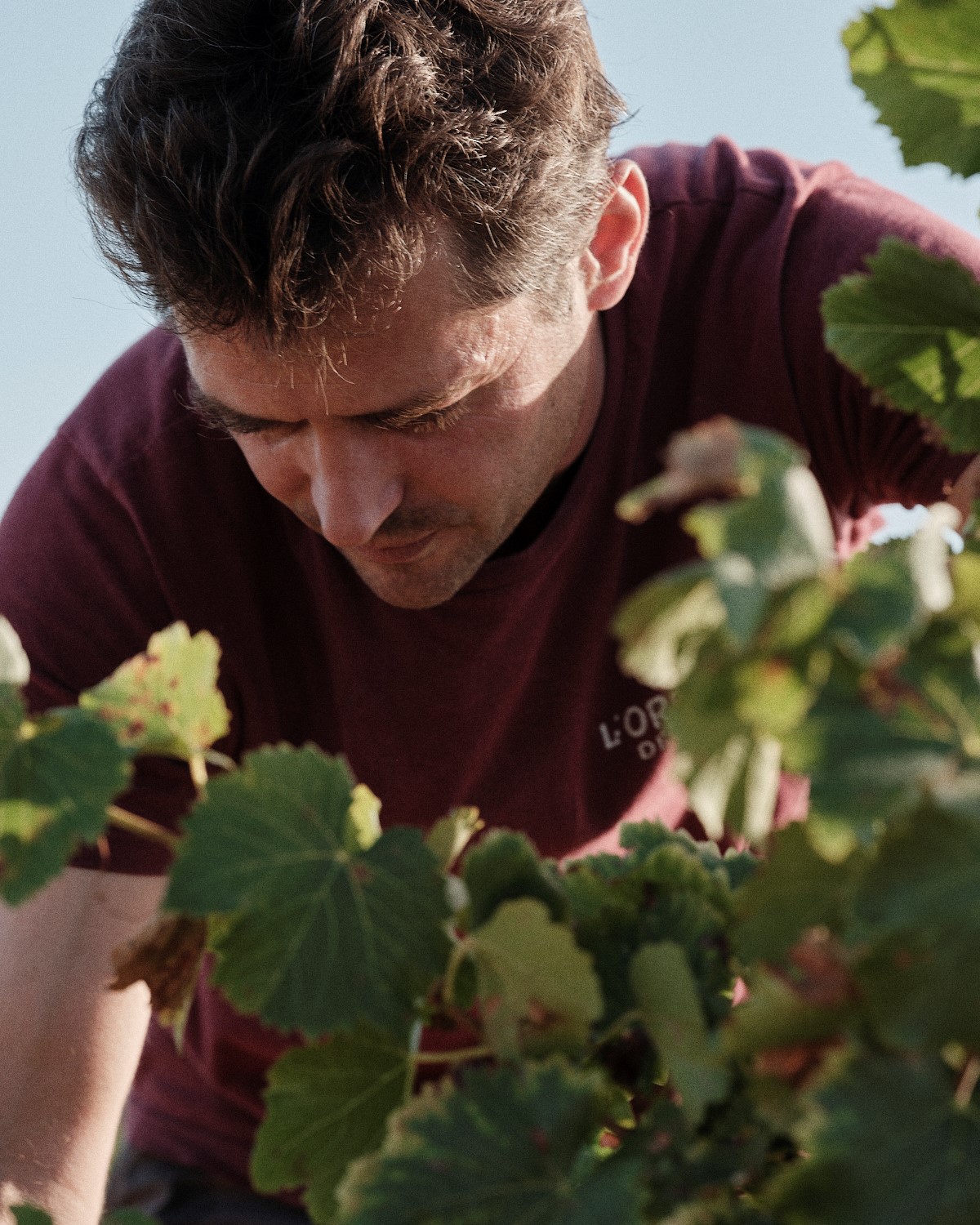
Vineyard managment is the moment when man and nature come together in perfect symbiosis.
In order to achieve perfect balance in the vine, several different methods are used. In 2020 trials were carried out to test the effectiveness of plaiting the vine shoots rather than topping them (cutting the shoots that are too long). Pruning is adapted to suit the needs of each vine stock. The idea is to not harm the vine but rather to allow it to grow and live naturally. Furthermore, alternative methods have been implemented in order to protect the soils from weeds. Combinations of several different plant, grass, leguminous and crucifer species are sown between the vine rows. They have a unique root system which explores and loosens the soil to a certain depth. The leguminous species also have the ability to absorb atmospheric nitrogen and store it in the soil in the form of green manuring. There are two reasons behind the decision to carry out grassing. The first is to replace tillage so as to not mix the soil horizons (different layers of the soil) and the second is to bring as much life as possible to the soil and the surface of the soil. The vines are very often surrounded by hedges. These important green corridors and are composed of trees, ivy, bushes, wild asparagus and various other plant species. The hedges provide valuable shelter for macro-fauna (birds, bats) and insects.
As part of this same agro-ecological approach, this global and autonomous system, we opt to leave natural grass in certain sectors. This layer of vegetation helps to prevent erosion and acts as a food source for numerous species. Then in late February to early March, a shepherd brings his sheeps into the vines. In addition to the remarkable work they do in just a few hours, they also leave quite a few souvenirs behind them in the parcels. A bit smelly admittedly but a very rich fertilizer! Here again it is the natural cycle that is bringing life to the soils.
‘What we need in order to produce living, breathing wines is living, breathing soils and a carefully nurtured and well nourished vine that has not suffered any kind of trauma.’ Edouard Guerin
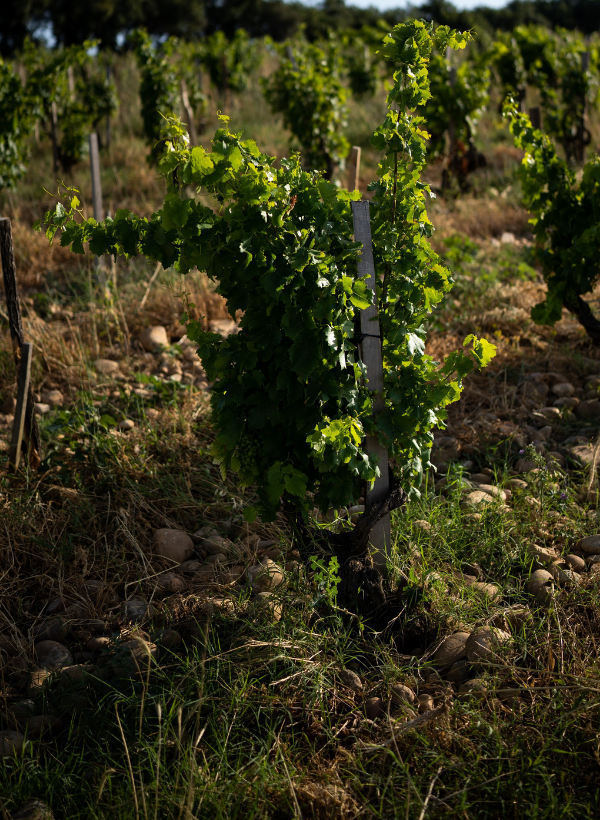
“What we need in order to produce living, breathing wines is living, breathing soils and a carefully nurtured and well nourished vine that has not suffered any kind of trauma.”
THE CELLARS
A PLACE UNLIKE ANY OHTER
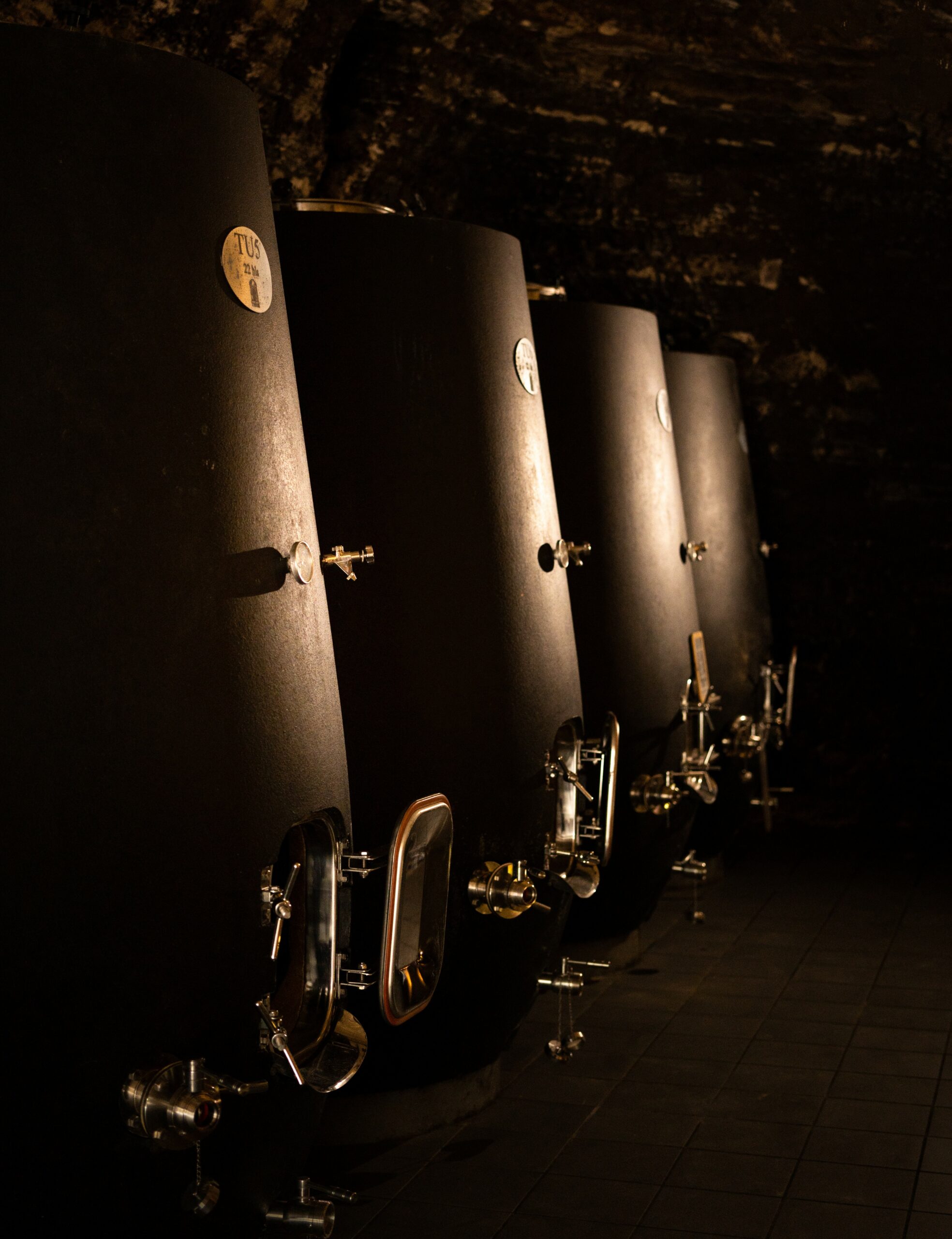
L'ORATOIRE DES PAPES WHITE
A wine with a strong personality revealing exceptional freshness and a pleasant bitterness imparted by the limestone soils and “safres” soils of Châteauneuf-du-Pape.
The harvests are carried out early and exclusively by hand in order to retain the wine’s natural acidity and freshness.
Once the grapes arrive in the cellar they are pressed delicately as whole clusters. This gentle ‘champagne style’ pressing technique lasts for 7 to 8 hours rather than the average 2 hours. The process involves pressing and de-compacting the grapes then pressing them again with the aim of extracting the purest juices possible.
Vinification takes place 80% in eight tulip-shaped concrete vats and 20% in 300L new oak barrels. The egg-like form of these tulip vats creates a gravitational movement (known as ‘the vortex phenomenon’) which helps to keep the lees suspended naturally, without stirring, thereby developing the wine’s aromatic potential.
80% of the wine is aged in concrete vats and 20% in French oak barrels. The wines are aged on their full lees with stirring carried out solely for the barrel aged wines. The final blend is composed in springtime, somewhere between March and early May depending on the vintage.
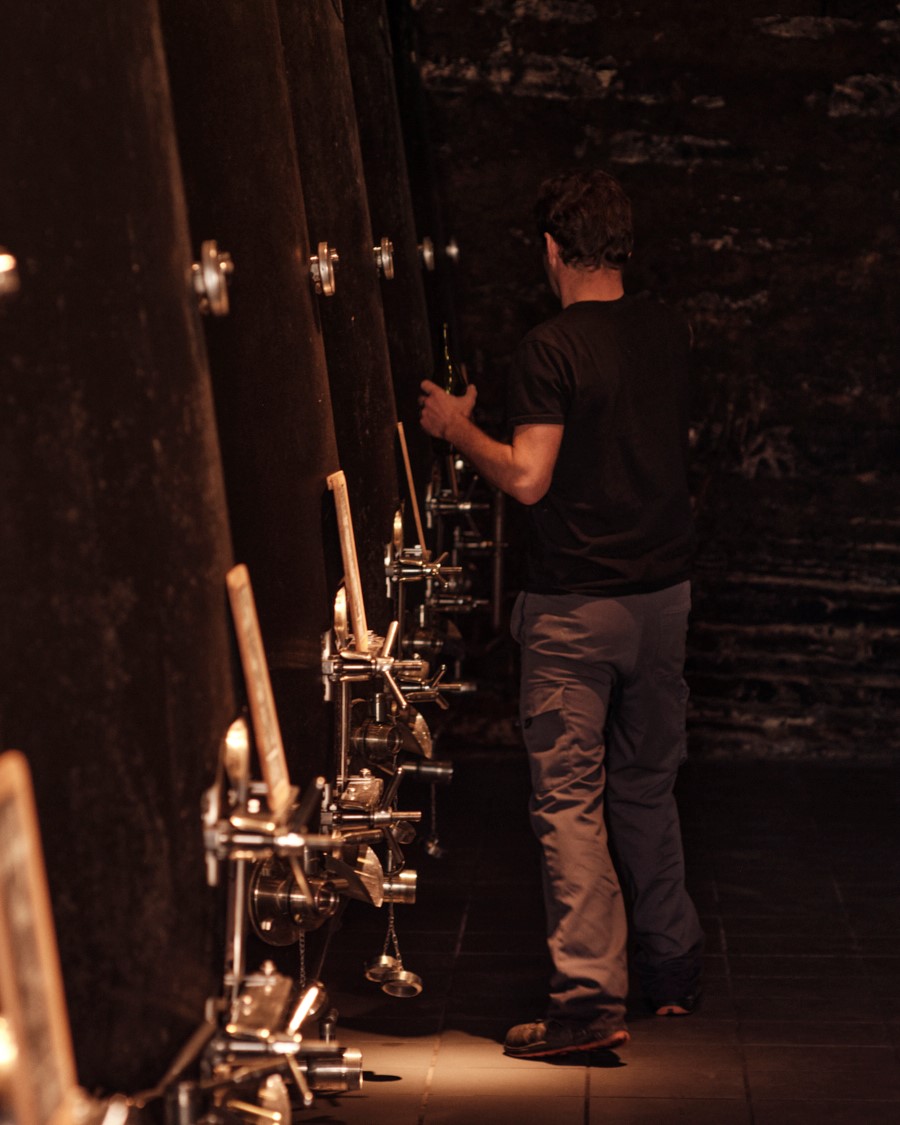
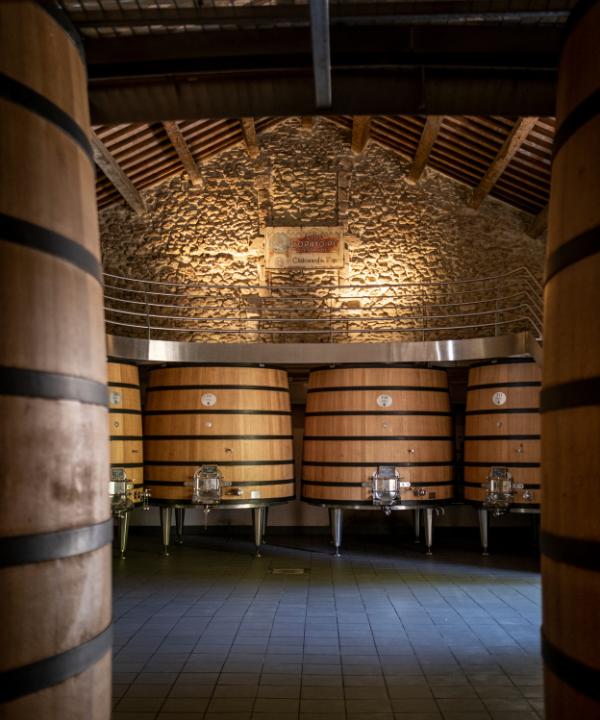
L'ORATOIRE DES PAPES RED
The quintessence of the appellation’s 4 terroirs in a Grenache based blend.
This wine is made from grapes grown in rolled pebbles soils, red clays, limestone fragments and sandy soils and is vinified with the utmost respect for winemaking traditions.
The use of co-fermentation during the vinification process is a further example of our savoir-faire in combining several different terroirs in the same vat. The objective of blending together varietals grown in different soil types in order to reveal the impact of these terroirs which are so unique in Châteauneuf-du-pape. For example the Syrahs planted in clay soils balance out the limestone soil Syrahs. The combination of rolled pebbles and sandy soils is really what makes this cuvée so iconic. Rolled pebbles are the signature of Châteauneuf-du-Pape and are known for the intense, vinous character and notes of stewed fruits that they impart to the wine. The sandy soils, on the other hand, are generally regarded as producing a more delicate style of wine with silky tannins, black fruits and exceptional finesse.
Thanks to this process of co-fermenting different varietals and different soil types, the tasting experience promises a well crafted alchemy between purity of fruit, silky tannins and depth of character.
The first twelve months of ageing takes place in oak tuns followed by pre-blending in concrete vats for 6 to 8 months. The wines therefore spend two winters being aged in order to give them their natural stability, smooth texture and delicate mouthfeel. They are bottled in springtime when temperatures are in the region of 15°C.
L’Oratoire des Papes red can be enjoyed in its youth or kept in the cellar for at least a further 8 to 10 years and as long as 15 years for the finest vintages.
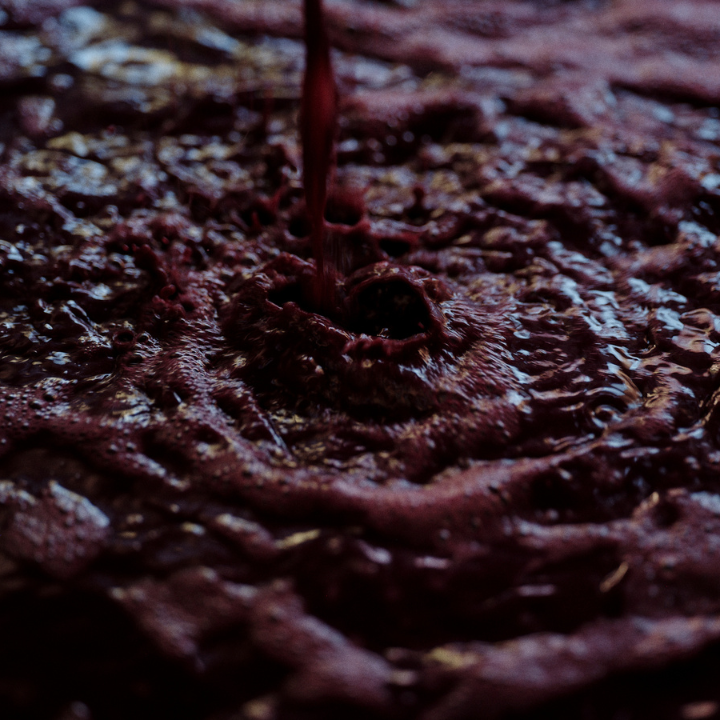
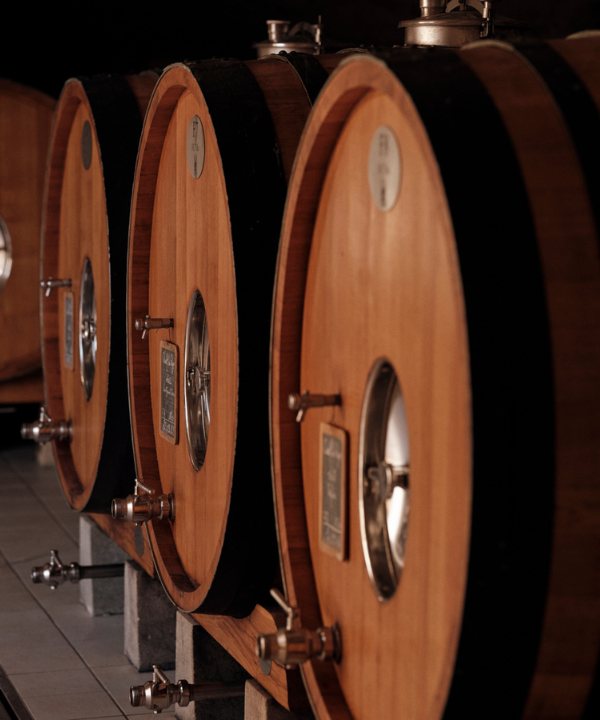
PARCEL SELECTION LES CHORÉGIES RED
The harvests are carried out by hand and the clusters are sorted with precision. The Grenache is conserved as whole clusters and gently crushed.
Les Chorégies red are vinified exclusively in 18.7hl tuns. This greater surface area for exchange between the skins and the juice gives the wine structure and complexity.
‘The 18.7hl tuns enable us to maximize the surface area for exchange between the skins and the juices thereby imparting greater structure and complexity to the wine.’ Edouard Guerin
As a result of the maceration that takes place in these tuns, the solid matter (skins, pips, stalks) remains submerged in the wine. The shape of these tuns prevents the marc cap from being in contact with oxygen and instead it remains permanently submerged resulting in a slow and delicate infusion.
This is followed by alcoholic fermentation which lasts between 8 to 10 days at temperatures of around 28°C to 30°C. The vatting period can last for as long as 7 weeks which allows us to create wines with such soft, delicate tannins and excellent length, tension and balance.
Pressing is carried out using a small vertical press with pneumatic piston which ensures high quality and pure press wines which are most often blended with the free run wine afterwards.
The wines are aged for 8 months in French oak tuns and then 8 months in concrete vats before being left to rest in the bottle for at least 18 months.
With the precision and skill of a choirmaster, Edouard Guerin is in full control throughout every stage of vinification and ageing in order to ensure unrivaled finesse and complexity in the finished wine.
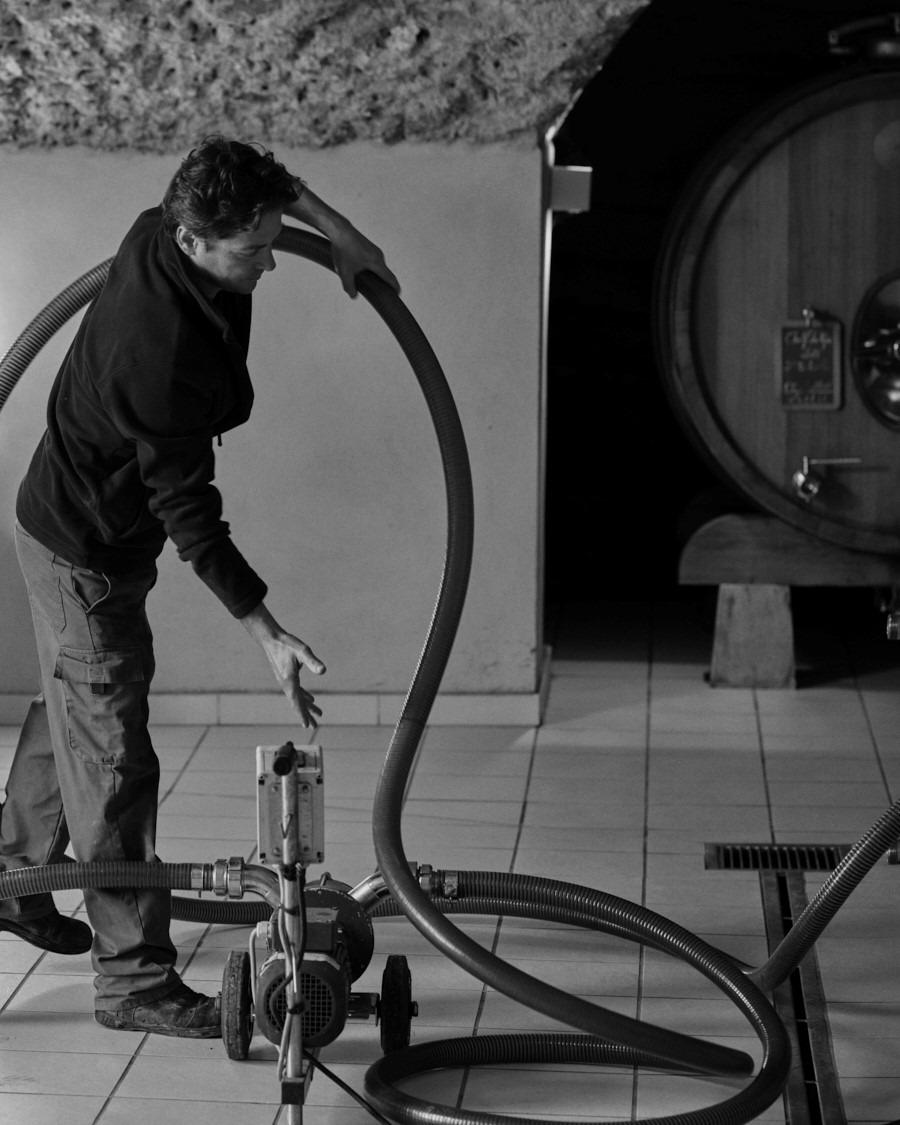
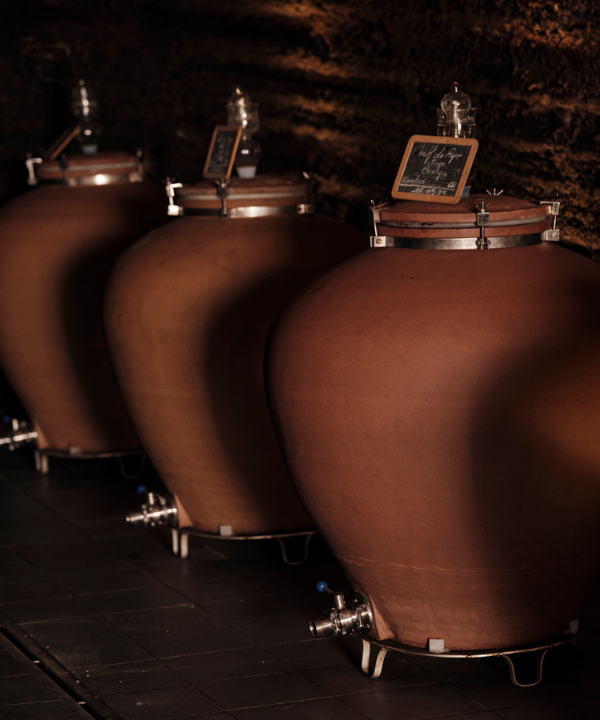
PARCEL SELECTION LES CHORÉGIES WHITE
The Les Chorégies white troglodyte cellar houses the four 600 liters ceramic amphorae and the 300 liters French oak barrels that give life to this immense white Châteauneuf-du-Pape.
After several years of meticulous, dedicated work, a few old vines of Clairette and Bourbourlenc on parcels of fragmented limestone were selected for separate vinification. These two grape varieties were picked early, some would even say underripe, but at their peak expression of the terroir. Not known for their strong personalities, they reveal the finest expression of their place of origin.
The bunches are meticulously sorted before their arrival in the cellar, where they are gently pressed in whole bunches. This ‘champagne style’ pressing lasts between 7 and 8 hours rather than the customary 2, allowing us to obtain the purest possible juices.
The vinification of Les Chorégies white takes place for 40% in 600 liters ceramic amphorae, and 60% in 300 liters French oak barrels in ambient temperatures to obtain the most natural fermentation possible. One of the attributes of ceramic is its impermeability to oxygen. This protects the wines and maintains them in a reductive environment.
Some six metres underground, 60% of Les Chorégies white is aged for 8 months on its lees in French oak barrels, with regular stirring for 3 months, and 40% on lees in amphorae. Once the final blend is complete, the wine undergoes a rest period in bottle for 10 months before being released.
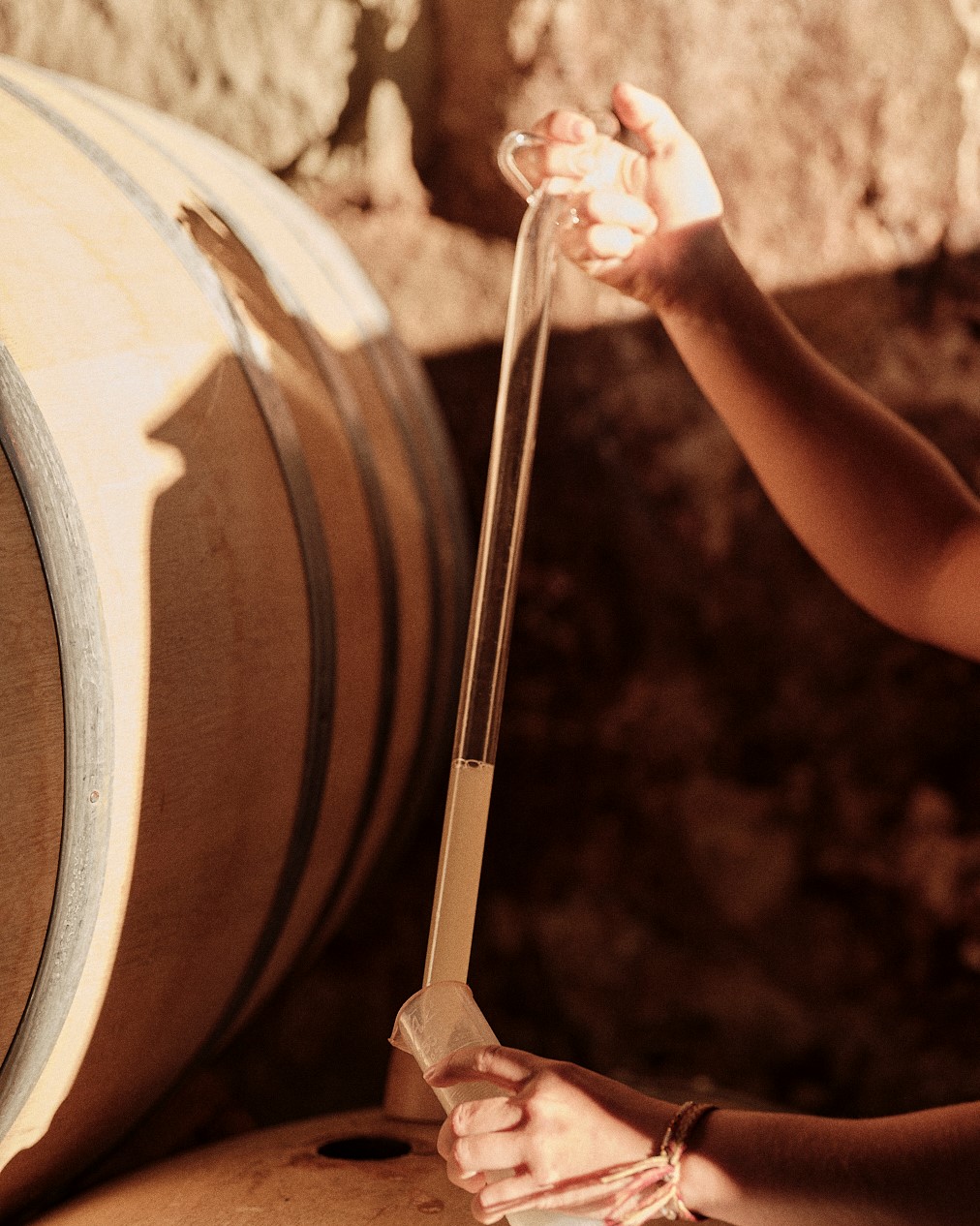
‘I am fortunate to be able to work together with our teams, in both the vineyards and cellars, to go above and beyond with each new year and create wines that are deeper, more living and breathing than ever before.’
TECHNICAL DIRECTOR
EDOUARD GUERIN
Edouard grew up with his family in the Drôme Provençale region and enjoyed a childhood that was swayed by the seasons, picking apricots in summer and almonds in autumn time.
It was always very frustrating for him when he had to get back to school just as the harvests were getting started. His father and grandfather has already succeeded in instilling in him their passion for wine and the vine at this early age.
Edouard did not enjoy school although he was certainly intelligent enough to know what he wanted to do with his life. He enrolled in Agronomy studies at the Lycée du Parc in Lyon which paved the way for him attending the ENSAIA college in Nancy where he qualified with a degree in agronomy engineering. He was a very bright student, capable of working towards several different goals at the same time, and somehow managed to graduate with a diploma in Viticulture and Oenology from the Montpellier Agronomy School in the very same year. He completed his National Diploma in Oenology in 2005.
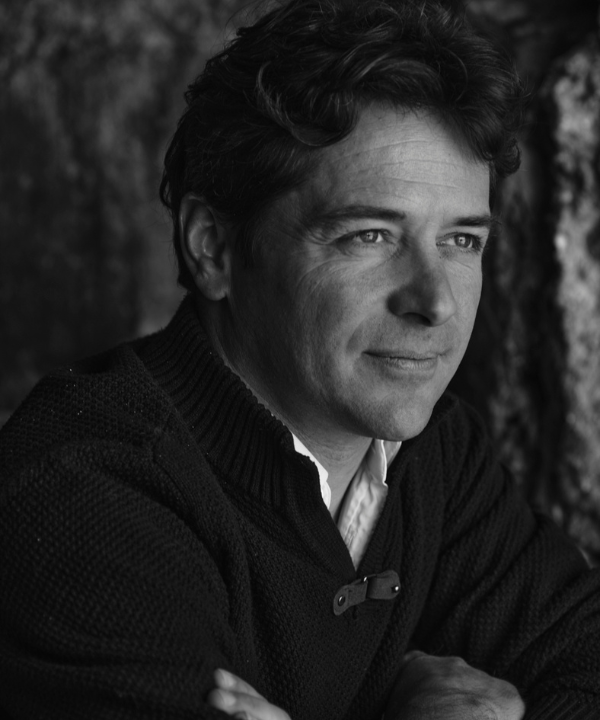
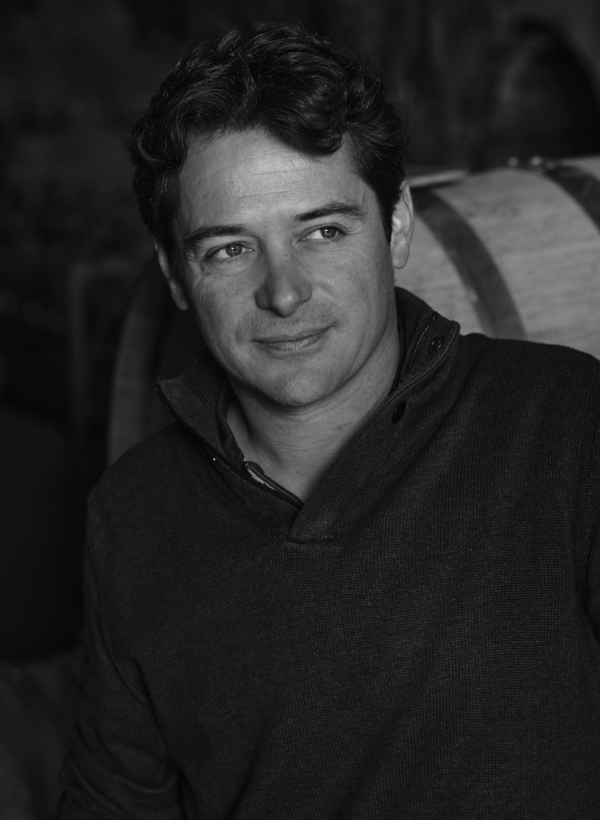
Edouard is curious, ambitious and has always been interested to know what is being done ‘elsewhere’.
In 2007 he moved with his family to Cappadocia in Turkey where he spent five years working as technical director for Maison Turasan, a grape producer and merchant. The indigenous varietals and unique terroirs of this region enabled him to discover the true extent of his talents.
His thirst for knowledge and technical expertise led him to Australia where he worked as general manager and then technical director for Maison Chapoutier Australia up until 2013.
He missed France’s terroirs and so the opportunity to join Maison Cazes in Roussillon was one that he couldn’t turn down. He therefore began working as technical manager at Clos de Paulilles upon his return to France.
When he joined L’Oratoire des Papes in Châteauneuf-du-Pape in 2015 it was as if he had found his calling, as if he was finally coming home. The Maison had plenty of interesting projects in the pipeline and great ambitions for the future which suited him down to the ground. The unique terroirs of the Rhône Valley were like an exciting playground for Edouard in his role as Technical Director.
Edouard is now able to give free rein to his passion and savoir-faire in the vineyards and cellars. His artistic talents are palpable when tasting of each and every one of the wines from L’Oratoire des Papes.
‘I am fortunate to be able to work together with our teams, in both the vineyards and cellars, to go above and beyond with each new year and create wines that are deeper, more living and breathing than ever before.’

